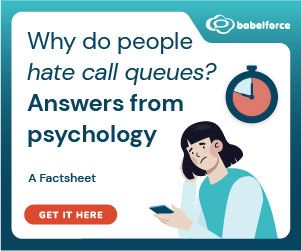The digital era arrived with the promise of simple, efficient, automated customer interactions that deliver seamless experiences and inspire loyalty.
But for most businesses, customer communication strategies are increasingly fragmented. Data is siloed and communication channels are managed through disconnected teams and technologies. In short, businesses find themselves spending way too much to deliver substandard experiences to customers.
So what if there was a way to turn the cost-versus-customer-experience equation on its head? With a one-platform omnichannel approach you can do just that – streamlining interactions, driving efficiencies, and boosting CX to new levels at the same time.
Here’s how.
The Omnichannel Journey Explained
Omnichannel doesn’t necessarily mean using every conceivable communication channel available to you. It’s more about using the channels that are right for your customers, and then integrating them effectively so communications can move seamlessly between them.
It’s also about enabling any type of customer interaction across the whole customer journey – whether that’s marketing, sales, authentications, reminders, or the multitude of other interactions businesses need to have with customers.
It doesn’t matter if you only use email, SMS and voice for now, you can still take an omnichannel approach. First you need to make sure interactions are all based on unified data from a central source. Then you can look to automate as many interactions as possible to increase efficiency and effectiveness.
Finally, you can expand into more of the channels and formats that will boost customer experience. For instance, if you already use SMS you could explore MMS or RCS. Or you could add a popular chat channel such as WhatsApp or Messenger.
The Omnichannel Dividend in Action
Digital marketplace is a great example of how implementing an integrated platform for omnichannel communication improves customer experience while also saving money.
Beam&Go was using different tools and providers for different communications channels. The result was siloed data, long customer response times, excessive running costs, and ineffective campaigns.
Switching to a unified, cloud-based platform for omnichannel communication significantly enhanced its customer experience. Beam&Go improved response times 100% and easily introduced new channels such as Messenger, WhatsApp and Live Chat. At the same time it cut costs by an impressive 30%.
Implementing a connected cloud communications platform is a win-win approach that enables you to future-proof communication as your customers shift to new channels.
Let’s take a deeper look at how an omnichannel approach improves CX while also cutting costs.
Streamlining the Customer Experience
Good customer experience results in loyalty, advocacy and high lifetime value, while poor customer experience has the opposite effect. We recently identified four fundamental ways to deliver great customer experiences:
- Provide a fast, personalized service
- Eliminate friction to make your customer’s life easier
- Enable self-service capabilities for instant answers
- Communicate via your customers’ preferred channels
An omnichannel approach to customer communications helps you achieve all these things.
Interactions can take place on your customer’s channel of choice, whether that’s their favorite messaging app or a live chat on your website.
Self-service capabilities such as chatbots or interactive voice response (IVR) can provide instant answers, and processes such as authentication can easily be built into the customer journey to minimize friction.
And all data is accessible from a central point, which means responses can be tailored to the customer’s unique needs with no time-consuming switching between channels.
With people wanting seamless, personalized interactions on the channels that suit them, it’s not hard to see why an omnichannel approach helps you boost customer experience. But how about the cost side of the equation?
Increase Efficiency to Reduce Costs
Implementing an omnichannel communications platform helps you cut costs by increasing efficiency. It allows you to leverage digital channels, real-time insights and automation to optimize your customer’s journey and interact with them in the most cost-effective way.
A traditional customer contact centre is often one of the biggest drains on your communication budget, so let’s use it as an example of what an omnichannel approach can achieve.
If you operate a legacy contact centre, you probably still use on-premise hardware that limits the channels you have access to and is expensive to upgrade.
Query resolution often takes far longer than necessary as agents waste time switching tabs or tools, and cross-referencing conversations that took place on different channels. With limited access to customer context and conversation history, they may need to start from scratch with every call.
Implementing a cloud contact centre as part of an integrated solution can help you increase efficiency (while improving customer experience) in a variety of ways:
- Reduce Resource Requirements by introducing a chatbot to deal with simple customer queries across a variety of channels and hand over to a live agent only when necessary. Chatbots are cheap, reliable, and never take time off.
- Save Time (and Time is Money) with a single place to access customer data and interaction history from all channels. Agents can quickly and easily pick up the conversation and proceed to resolution. They can even handle multiple conversations on different channels at the same time.
- Avoid Expensive Upgrades by implementing a platform that is scalable and flexible so you can easily and cheaply add relevant, new channels to meet your customers’ needs. With a cloud-based platform agents can work from anywhere, dramatically reducing overheads.
You Can Please Everyone
Of course it’s not just customer contact centres that benefit from a data-driven omnichannel approach. Marketing teams, for instance, can reduce their reliance on repetitive manual processes. They can increase conversion rates by automating campaigns based on customer behavior, and scaling them across a huge range of channels.
What’s more, with analytics a key part of an integrated platform, businesses can monitor how customers engage on every channel and use that insight for campaign optimization.
And it’s not all about cutting costs. An integrated approach can also be a revenue booster. As we discussed earlier, better customer experience and increased satisfaction means customer loyalty and advocacy.
This translates to repeat purchases, recommendations to friends and family, and increased appetite for special offers or promotions. In short, it inflates customer lifetime value.
If you carry on using disjointed channels and multiple platforms to communicate with your customers, you’ll always be a step behind. But if you take an integrated approach with a cloud-based omnichannel platform you get the double benefit of happier customers and lower costs.
You can also get one step ahead and set up your communication strategy for whatever the future holds.
Author: Guest Author
Published On: 21st Jan 2022
Read more about - Guest Blogs, Infobip















